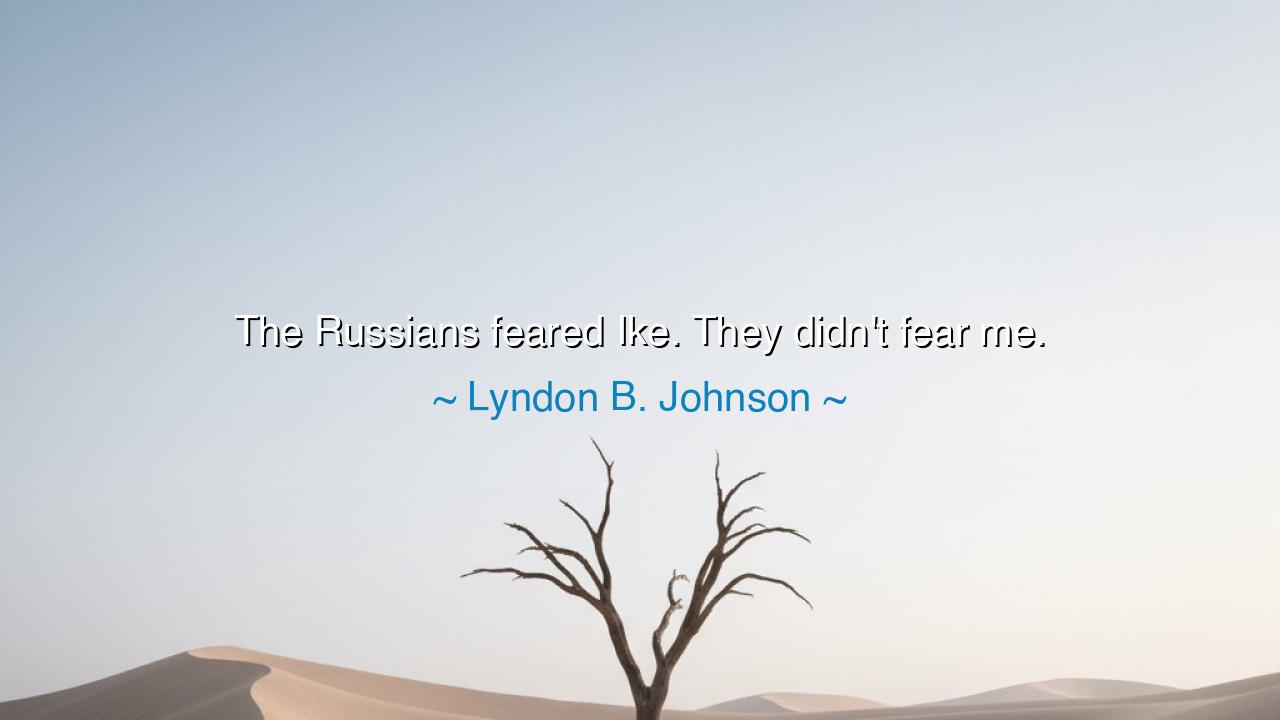
The Russians feared Ike. They didn't fear me.






In the solemn and candid confession of Lyndon B. Johnson, the world hears both humility and revelation: “The Russians feared Ike. They didn’t fear me.” These words, though simple in form, tremble with the weight of history. They speak of power and perception, of how the shadow of one man can loom across nations while another stands unseen. It is a lament not merely of authority, but of the nature of respect, strength, and the unseen forces that shape the hearts of men. To understand this saying is to gaze deeply into the soul of leadership itself.
The origin of this quote lies in the years following Dwight D. Eisenhower’s presidency, when the Cold War’s icy breath chilled every corner of the earth. Eisenhower, or “Ike,” as the people called him, was a man forged in the fires of war—a general who had led the armies of freedom across Europe and witnessed tyranny crumble beneath his command. His very name carried the echo of victory, the authority of command, and the calm assurance of one who had faced the abyss and prevailed. The Russians feared Ike not only for his weapons or armies, but for the legend he embodied—a man who could command nations as once he commanded legions.
When Johnson rose to lead after the tragic death of John F. Kennedy, he found himself inheriting not only a divided nation but a fragile peace balanced upon the knife’s edge of nuclear dread. His lament—“They didn’t fear me”—was not born of envy, but of understanding. For he knew that power rests not solely in office, but in presence; not merely in words, but in the weight of history that stands behind them. Johnson had strength of his own—moral conviction, political mastery, and the iron will to build a Great Society—but he recognized that the symbolic might of a warrior-president like Eisenhower could never be easily replicated.
Consider, then, the truth hidden within his words: that fear, when tempered by wisdom, can preserve peace. The ancients knew this well. They said that a lion does not need to roar to be known as king; the knowledge of his strength keeps the forest still. Eisenhower’s very silence was thunder, his calm a warning. When he spoke, nations listened, for behind every word stood the memory of Normandy, the weight of command, and the quiet dignity of one who had faced death for the sake of peace. Johnson, by contrast, wielded diplomacy and compassion—tools no less noble, but less feared by rivals who understood only the language of power.
There is a story from those perilous years that reveals the wisdom of this contrast. During the tense Cuban Missile Crisis, it was Eisenhower’s counsel, though he was no longer president, that steadied Kennedy’s hand. His voice—measured, patient, resolute—reminded the young leader that strength need not be proven through war. It was the memory of Eisenhower’s resolve that lent weight to America’s warning. Even in retirement, Ike’s name commanded reverence, his mere existence a deterrent to chaos. Such is the power of character that transcends time and office.
From this tale, my children, learn that true strength is not bestowed—it is earned. It cannot be declared; it must be demonstrated through discipline, courage, and the steadfastness of one’s deeds. Johnson’s lament is thus also a teaching: that fear born of respect is not evil when it guards the peace, and that leadership without the aura of conviction is like a blade without edge—beautiful, but blunt. If you would be respected, live so that your actions speak when your voice is silent.
And yet, let us not forget the deeper virtue in Johnson’s humility. To acknowledge another’s greatness is itself an act of greatness. He saw in Eisenhower a mirror of what the world admires—firmness, certainty, strength—and yet chose a path of service and compassion, building not empires but equality. The Russians may not have feared him, but his people loved him. And love, though quieter than fear, endures far longer. For when fear fades, love rebuilds; when power falls silent, goodness speaks still.
So take this lesson to heart: Be strong, but be just. Be feared, if you must—but only through the righteousness of your deeds. Let your life command not submission, but respect. Let your name, like Eisenhower’s, stand for steadfastness—and your heart, like Johnson’s, for understanding. For in the dance of history, fear may keep the peace, but character sustains it. And it is character, not fear, that shall outlast the trembling of nations and the turning of ages.






AAdministratorAdministrator
Welcome, honored guests. Please leave a comment, we will respond soon